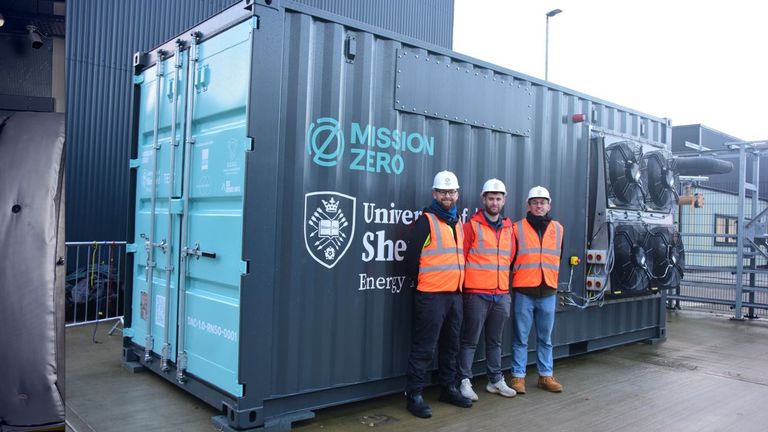The UK’s first-ever direct air capture plant has been turned on to remove CO2 from the atmosphere and turn it into jet fuel.
The machine, developed by Mission Zero Technologies in partnership with the University of Sheffield, will run on solar power to recover 50 tonnes of CO2 from the air per year and turn it into Sustainable Aviation Fuel (SAF).
Sky News was given exclusive access to the new plant and spoke with Nick Chadwick, Mission Zero Technologies CEO, who explained that the machine is able to “hoover vast volumes of air, separate selectively the CO2 that is in the atmosphere, and then reject the atmosphere back to where it came from without the CO2 in it”.
There has been a lot of excitement about direct air capture recently – with companies like Alphabet and JPMorgan Chase investing significantly in it.
But some say it’s not a very efficient way of removing greenhouse gas emissions from the atmosphere.
Dr Steve Smith, executive director of Oxford Net Zero, noted how these projects are “really small and really expensive”, adding that there are more energy-efficient alternatives to cut down greenhouse emissions such as switching to renewables.
However, he added that scaling different technologies like direct air capture could help us get close to our climate targets.
The scientists at Oxford Net Zero aren’t just sucking carbon down from the atmosphere, but also using that carbon to make sustainable jet fuel.
Aviation accounts for about 2% of the world’s emissions and Ihab Ahmed, research associate from the University of Sheffield, said the fuel has the capacity to massively reduce the impact of aviation on the environment – and is an important step towards the government’s ambitious target to increase the use of SAF to at least 10% by 2030.
But Alethea Warrington, from the climate crisis charity Possible, told Sky News that the impact of these alternative fuels is “quite small”.
Warning “there’s a lot of problems with them”, the campaigner added: “SAF fuels which are made from carbon and hydrogen require an absolutely huge amount of energy that just isn’t going to be available to make them in any more than a very small scale. Biofuels would require a huge amount of land that could cause deforestation and even more emissions.”
As with a lot of climate technology, it’s not always a silver bullet – but there is a growing consensus in the research community that trialling new technologies to potentially scale them in the future is the way to go if we want to stay close to our climate targets by mid-century.
